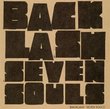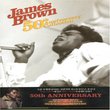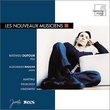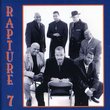| All Artists: Ludwig van Beethoven, Franz [Vienna] Schubert, Jascha Horenstein, BBC Northern Symphony Orchestra, John Ogdon Title: Beethoven: Piano Concerto No. 5; Variations (32) in C minor; Schubert: Piano Sonata in C minor Members Wishing: 0 Total Copies: 0 Label: BBC Legends Release Date: 4/27/2004 Genre: Classical Styles: Chamber Music, Forms & Genres, Concertos, Sonatas, Historical Periods, Classical (c.1770-1830), Instruments, Keyboard Number of Discs: 1 SwapaCD Credits: 1 UPC: 684911414226 |
Search - Ludwig van Beethoven, Franz [Vienna] Schubert, Jascha Horenstein :: Beethoven: Piano Concerto No. 5; Variations (32) in C minor; Schubert: Piano Sonata in C minor
CD DetailsSimilar CDs
|
CD ReviewsIN MEMORIAM DAVID BRYSON | Glossop Derbyshire England | 09/11/2004 (5 out of 5 stars) "For those who sense real greatness in Ogdon, this is an issue not to miss. I say without reservation that this is the finest performance of Schubert's great C minor sonata that I have ever heard. The Beethoven variations are notable too, and as for his Emperor - well, wait till I tell you about that.
In the Schubert sonata I already owned accounts by Zacharias who is very good, and by Lupu who is even better, but Ogdon transcends them both, and anyone who wants to hear what he really amounted to at his best needs to find this performance. I can pick out a string of notable individual features - the superb portamento weighting of his touch in the second theme of the first movement, the hushed mystery and unease in the latter half of the development in the same movement, the dark inconclusive finish to the movement, the exquisite harp effects late in the slow movement, the perfectly judged tempo in the so-called minuet - these and numerous others. However a great and characteristic Ogdon reading always shows, I seem to find, an exceptional dimension of concentration and focus. I find it here in each of the movements individually, but I find it most of all at the level of the complete work. Tempi for me are absolutely right throughout. The first movement is neither rushed nor allowed to relax, the adagio is slowish as it must be if its sadness is to express itself fully, and the tempo of the `minuet', which Zacharias and others don't quite understand, is absolutely spot on. There is not much feel of a dance about this minuet, and the tempo-marking is `allegro'. That commonly signifies that the movement is really a scherzo in Beethoven's sense, as in his first symphony or in Haydn's last quartet, but not here. Allegro here means what it means in Beethoven's piano sonata op 10/3 - too fast for an ordinary minuet but flowing rather than frenetic, and Ogdon makes matters perfect by using a hint of staccato in his right hand. The finale is out of this world and out of the league of other performances I know - played fairly quietly (as marked) but seemingly taken in one gulp, a single huge phrase played with an unremitting tension in the rhythm and phrasing. Ogdon observes the first movement repeat which Lupu unaccountably omits - it's absolutely essential to the scale of the work, and the movement lasts only 9 and a half minutes even when it is played. Beethoven's variations in C minor, from 1806, are a kind of chaconne or passacaglia, probably inspired by Bach's chaconne for solo violin - a fine piece in my opinion although not the equal of what Bach and Brahms rose to with this form. I have owned a notable performance by Arrau for many years, and on a fine balance at this stage I still prefer Arrau's `leaner' touch and pedalling. It's really a matter of detail and there's little enough to choose. I'm pleased now to have both, and I loved in particular Ogdon's handling of the variation with the upward-rushing scales. This Emperor is a fine (live) performance too, if not in the great class, but there is a glaring howler near the end, where Ogdon comes in too early and plays over the solo unaccompanied bassoon. Happily this does not produce any discords in the harmony, and the orchestra (now known as the BBC Philharmonic) under Horenstein react with admirable presence of mind. I found it too good a laugh to be upset by it, and I wonder whether this good-humoured big friendly giant and the orchestral players thought the same. There is a faint sense that Ogdon was enjoying the occasion slightly to the detriment of his fullest concentration, as there are half-a-dozen finger-fluffs (never amounting to an outright mis-strike) in the outer movements. I enjoy the account thoroughly. Ogdon clips two minutes off Michelangeli's timing in every movement, taking the sort of speeds Serkin used to take in the first and last, but very much faster than Serkin in the central adagio. As you might expect, there are some notable touches even here, and I was struck immediately by Ogdon's slowish declamatory handling of the opening flourishes and by a good clean articulation in the theme of the finale, a passage notorious for tripping up the most eminent players, some of whom shall be nameless. Somehow one minds a minor mishap like this less from Ogdon than from any other of the great virtuosi - he was just such a nice guy. His career at his best was only 10 or 11 years, from winning the Tchaikovsky competition to the onset of his heartbreaking hereditary illness. As far as I'm concerned he had already broken through into the top flight, the tragedy is that he was struck down in his early prime. For those of us who treasure his memory, this is a notable issue even at its second-best. At its outright best in that Schubert it is a lot more than just notable." |

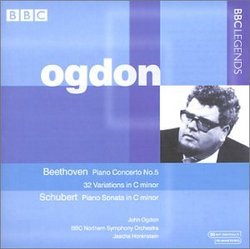
 Track Listings (8) - Disc #1
Track Listings (8) - Disc #1
